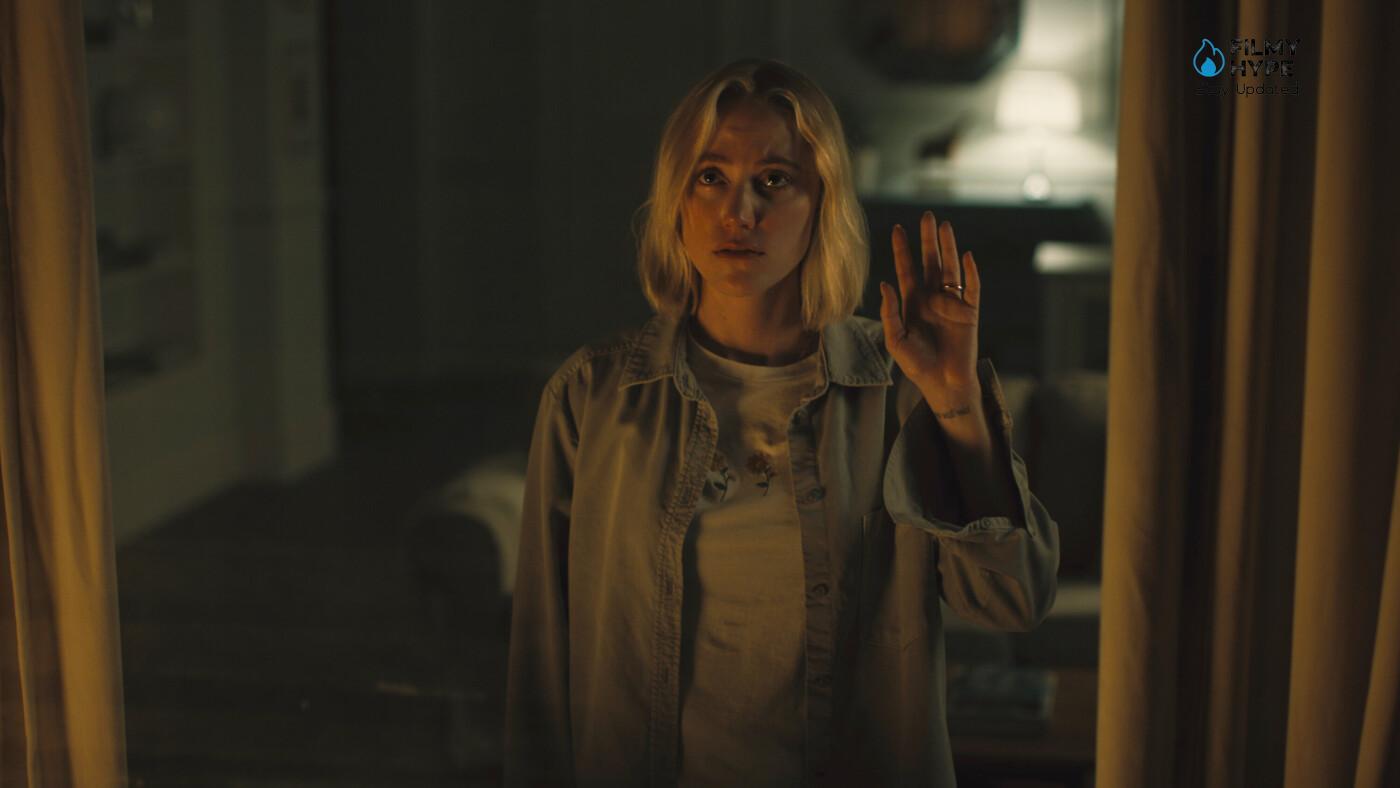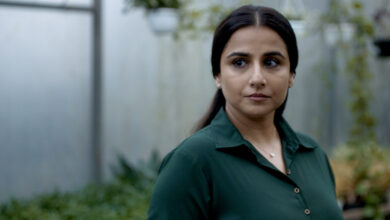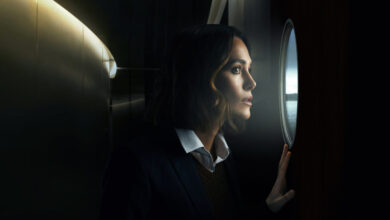Watcher Review: A Classic Horror Starring Maika Monroe and Karl Glusman (Venice 79)
Stars: Maika Monroe, Karl Glusman, Burn Gorman
Director: Chloe Okuno
Filmyhype.com Ratings: 3.5/5 (three and a half star)
Watcher is an American psychological thriller, directed by Chloe Okuno, and starring the American actress Maika Monroe. The film is distributed by Lucky Red and Universal Pictures and was presented in American theaters on June 3, arrives in Italian cinemas on September 7, 2022, with Lucky Red and Universal Pictures. A story that moves between nightmare and reality. A woman victim of stalking and morbid paranoia that will lead her to lose clarity on the daily reality of the facts. Not an original story from this point of view, having already been treated by other masters of cinema in the past.

We must say, however, in no uncertain terms, that at the end of the viewing the film convinced us in many respects and, frankly, we did not expect it. In the cast among the few actors present, the protagonist Maika Monroe certainly dominates the scene, and horror lovers are known for her interpretation of the beautiful It Follows. Beside her (so to speak) there is Karl Glusman in the role of a husband who is very busy with his new job. A story set between the four domestic walls and the streets of dark and cold Bucharest. If you are curious to know our thoughts on Chloe Okuno’s film, then you just have to get comfortable and continue reading the Watcher review.
Watcher Review: The Story
Julia has recently moved to Bucharest in Romania to follow her husband with his new job, a job that keeps him busy practically all day. For this reason, she finds herself, a little bored and a little curious, spending most of her time alone in a new city surrounded by people who speak a language she has yet to learn. The loneliness and apparent inhospitality of the new city, however, are the least of Julia’s problems, which she has the impression of being constantly spied on by a stalker. A mysterious figure looks at her from the window of the building in front of her. Or, at least, that’s what she believes.
Not only that, when she goes around she has the impression that someone is constantly following her: from the street to the cinema to the supermarket. Whether it’s a simple suggestion or something else, Julia begins to be afraid. As if that were not enough, in the city there is a serial killer on the loose who kills his victims, essentially women, by beheading them in their apartments. The latest victim was found right in the neighborhood where the young couple lives, one step away from their home. In panic and paranoia Julia finds herself fighting her worst fears alone and begins to try to see clearly.
Watcher Review and Analysis
The first part of the film seems to slowly weave the daily life of a couple in the first years of a peaceful and fulfilling marriage; a normal couple struggling with work successes and their respective commitments. A dimension destined to change, however, by modifying the narrative rhythm that from slow and cadenced evolves into ever increasing rhythms, slowed down in turn by disturbing paranormal implications and loads of anxiety. Since her arrival in Bucharest, Julia notices the ambiguous presence of a man, a shadow that secretly observes her from a window in a block of flats in front of her house. The very young American, although annoyed, does not pay much attention to the fact that this man in a disturbing way seems to spy on her every movement.
She is struggling with the need to familiarize herself with the city environment and while her husband works, she tries to settle in and learn the language in that city far from her and completely unknown to her. Through an excellent “game” of the camera, the man at the window begins to define himself more and more as a disturbing stable presence, occupying not only a physical and defined space but becoming magnified in the mind of the protagonist, who turns all her helms to him while new fears are ignited in her. Several femicides are taking place in the city at the hands of a serial killer nicknamed “The Spider” by the local crime news.
Julia sees the threat in this man, perpetually waiting behind her window. Fear turns into a distressing nightmare until it becomes reality; Julia feels watched and persecuted, and her anxiety about her increases. Francis, away from home for many hours due to her work, cannot understand his wife’s state, so much so that he considers her paranoid and unwilling to accept her changes and news. Instead, he will find full complicity in Irina, her neighbor who for months has noticed, from her apartment, the strangeness of this man, so much so that he is left by his partner, a gun to be able to defend himself from something that she does not comprehends.
Watcher is a story that travels in the paranoia of a woman who is strongly conditioned by a climate that places her in attitudes of defense against latent dangers veiled in mystery. A horror that does not propose itself in the usual plot of the genre, but goes far beyond recovering what is horrid, at times, hidden in real reality. News stories, unfortunately, to which we are used and which are often announced on the news but kept in the ambiguity of the indifference of a society dominated by excesses, extremisms and phobias. In the last part, the film takes on merciless, dramatic, bloody, inhuman colors, which dirty the walls of everyday life unaware of an announced and feared danger.
Stalking, paranoia, loneliness, fear. Watcher is certainly not the first film to address certain issues. Just as the situations described are not new either: a woman who fights with her fears alone, discredited by all those around her, starting with her husband. Julia has the distinct sensation of being constantly spied on by the neighbor from the opposite window. An obvious reference to Alfred Hitchcock’s The Window on the Courtyard but with reversed roles because in the story of Chloe Okuno it is the protagonist who is spied on.
All the tension of the film plays on the fact that this “initial distance” can be reduced to the point of bringing the two to meet face to face. The painful waiting for a possible showdown is the mainspring of the film’s suspense. Which, in the end, really happened in the film directed by the master of the thrill, without not a little apprehension in that now famous final scene with a meeting-clash. Always remaining on the cinema of Alfred Hitchcock we will be able to mention at least two other works that may have inspired Chloe Okuno in the drafting of the plot: The Suspect and The Shadow of Doubt.
But the question we ask ourselves halfway through the story is whether there is something true or whether it is all in Julia’s mind. We are actually bout a vulnerable woman, transplanted to a new city where she spends most of her time alone without being able to communicate with others due to an insurmountable language barrier. In this sense, a certain Roman Polanski made school who two of his most successful films, such as Rosemary’s Baby and above all the claustrophobic Repulsion with Catherine Deneuve, investigated the psyche of his protagonists tormented by fears, obsessions and paranoia.
And to complete the trilogy of the apartment we also put the tenant on the third floor. In this sense, it is difficult not to see a certain analogy with the works of Polanski when dealing with a psychological thriller like Watcher. But while Polanski remains more conceptual and metaphorical, then completely differentiating himself into the deeper meaning of the film, Watcher has far more concrete implications. We are talking about similar films for the emotional level on which they move but completely different for the final implications.
It is thanks to the direction and the convincing writing of Chloe Okuno that the viewer identifies with Julia experiencing the same paranoid delirium as the protagonist. We only ever have her point of view, we don’t know what happens to the other characters when I’m not with her. The dialogues in the language have not been deliberately subtitled to let us experience that sense of estrangement that Julia is going through. We absorb her insecurities and fears about her, we don’t understand if we are victims of her paranoia or if something horrible is going to happen. The essence of the film is all here: painful waiting, paranoia and suspense. The house that in the collective imagination represents a place of intimacy and protection is in Watcher instead a particularly anxious element for Julia, constantly spied on by a mysterious silhouette of the apartment opposite.
The beautiful wide-angle shots indoors feed the viewer’s sense of bewilderment by creating the misperception that spaces are larger than they are. The house no longer assumes the protective and safety role it should have but becomes a place that can be violated by anyone, and Julia knows this. On the technical level, however, while we praise both the direction and the writing of Chloe Okuno we have much less appreciated the management of the lights. Sometimes the lighting on stage, especially indoors, is too diffuse and lightening, probably also due to post-production that gives the image a too soft aspect, with a photograph that is excessively washed out in terms of colors.
Watcher Review: The Last Words
Ultimately Watcher is a psychological thriller that we recommend you see. Inspired by other famous milestones, full of quotes for cinephiles, Watcher is a mixture of drama and suspense, between reality and paranoia. A film focused on nightmares of the mind, waiting, suspicion but also loneliness. Chloe Okuno did a great job on both the directing and scripting level. The viewer acquires from the very first minutes the focus of the protagonist Julia identifying himself more and more with her point of view. The understanding between spectator and character becomes so intense that it almost absorbs their thoughts.







